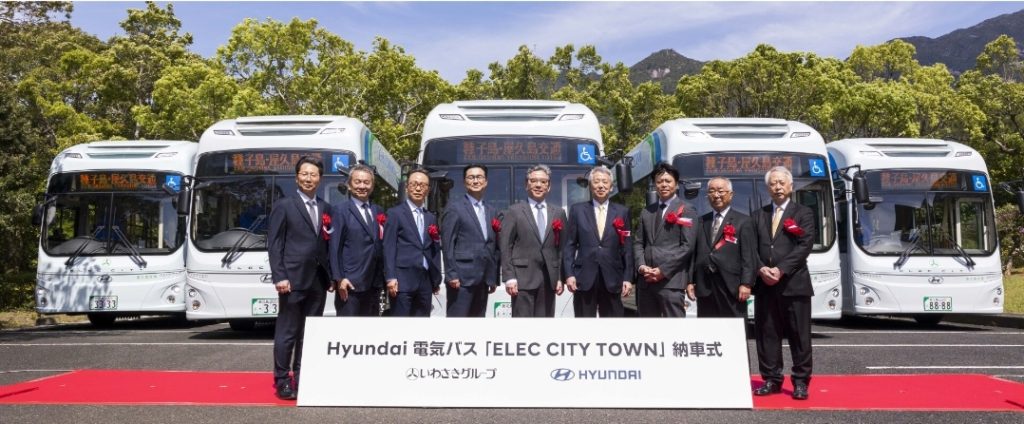Driving Change: Hyundai’s Zero-Emission ELEC CITY TOWN Bus Launches in Yakushima to Accelerate Clean Mobility
Hyundai Motor Company has taken a bold step toward a greener future. On April 21, 2025, Hyundai officially handed over its zero-emission ELEC CITY TOWN electric buses to Tanegashima Yakushima Kotsu, a local transportation operator in Yakushima, Japan. This island, a UNESCO World Heritage Site, now finds itself at the forefront of clean public transportation.
Yakushima Island’s stunning natural beauty makes sustainability crucial. Therefore, this initiative isn’t just a transportation upgrade—it’s an environmental milestone. With the delivery of these advanced electric buses, Hyundai and Iwasaki Group begin a new chapter in eco-conscious mobility.
During the handover ceremony, held on Yakushima Island, several key figures were in attendance. These included Hyundai Motor Group Vice Chair Jaehoon Chang, Hyundai Mobility Japan CEO Toshiyuki Shimegi, Iwasaki Group CEO Yoshitaro Iwasaki, and Yakushima Mayor Koji Araki. Their presence underscored the importance of this collaboration. Notably, this event followed an MoU signed in July 2024 for purchasing Hyundai’s electric buses.
In his speech, Vice Chair Jaehoon Chang expressed pride in this initiative. He stated, “I am delighted to see Hyundai’s ELEC CITY buses running here on Yakushima, contributing toward a cleaner island environment.” His words reflected Hyundai’s deep commitment to a carbon-neutral future.
Starting in June 2025, five Hyundai ELEC CITY TOWN buses will begin operations on the island. Designed specifically for Yakushima’s terrain and climate, these buses are both powerful and efficient. Each vehicle features a 145 kWh battery and a high-efficiency motor capable of delivering up to 160 kW, equivalent to 217 PS.
Advanced Vehicle Dynamics Control
Moreover, these electric buses come equipped with Hyundai’s advanced Vehicle Dynamics Control. This feature ensures smooth and safe driving across Yakushima’s winding roads and steep slopes. As a result, passenger safety and comfort are prioritized at every turn.
Additionally, the buses include a cutting-edge battery management and cooling system. Since Yakushima is known for its hot, humid climate, this technology is essential. It improves charging efficiency, enhances performance, and extends driving range—critical features for maintaining reliable public service.
But Hyundai’s initiative goes even further. On April 20, just before the handover, Hyundai signed a broader partnership agreement with local authorities. This agreement enables the use of the buses’ Vehicle-to-Home (V2H) technology. In times of disaster, such as typhoons or heavy rainfall, the buses can supply power to evacuation shelters and medical centers. This feature turns the buses into mobile energy hubs, supporting community resilience.
Transitioning Yakushima to electric vehicles fits perfectly with Kagoshima Prefecture’s wider sustainability goals. The region has designated Yakushima as a critical area in its plan to reach carbon neutrality by 2050. Accordingly, electrifying the island’s public transport represents an essential first step in that journey.
As a popular eco-tourism destination, Yakushima attracts nature lovers from around the world. Therefore, reducing vehicle emissions is not only a local issue but a global concern. Hyundai’s electric buses help preserve the island’s fragile ecosystem while setting an example for other regions.
Progress for Humanity Vision
Furthermore, Hyundai’s contribution aligns with its global vision of “Progress for Humanity.” This phrase reflects the company’s drive to create a more inclusive and sustainable world. Rather than just selling vehicles, Hyundai aims to offer solutions that support people, planet, and prosperity.
Importantly, Hyundai’s ELEC CITY TOWN buses were not just designed—they were optimized. Every detail, from motor efficiency to cooling technology, was carefully engineered for Yakushima’s specific needs. By doing so, Hyundai has shown that one-size-fits-all approaches no longer work in the age of climate change.
In fact, this project may signal a broader trend. As more communities face environmental pressures, tailored electric mobility solutions could become the norm. Hyundai’s effort on Yakushima could inspire similar projects across Asia and beyond.
Additionally, the partnership between Hyundai and the Iwasaki Group demonstrates how private companies can play a critical role in public infrastructure. When corporations and local governments work together, change becomes not only possible but scalable.
As Yakushima takes this leap toward sustainability, it does so with the support of cutting-edge technology and a strong community vision. The ELEC CITY TOWN buses are not just vehicles—they are symbols of a cleaner future.
What makes this initiative especially powerful is its long-term focus. While many projects aim for quick wins, Hyundai’s approach is strategic and forward-looking. From disaster resilience to long-term emissions reduction, the buses are designed to serve today and tomorrow.

Impact Goes Beyond Environmental Benefits
Moreover, the impact goes beyond environmental benefits. The electric buses also offer a quieter, smoother ride, enhancing the passenger experience. Tourists and locals alike will benefit from cleaner air and improved mobility services.
In conclusion, Hyundai Motor’s deployment of ELEC CITY TOWN electric buses on Yakushima Island marks a pivotal moment. It represents innovation in motion, combining advanced technology, sustainability, and community service. With this step, Hyundai leads the way in clean public transport, not only in Japan but across the globe.
As the first buses begin rolling out in June, all eyes will be on Yakushima. If successful, this model could become a blueprint for other islands, cities, and nations seeking to reduce emissions and embrace electric mobility. Ultimately, Hyundai’s bold initiative reaffirms that meaningful progress is possible—one bus, one route, and one island at a time.

